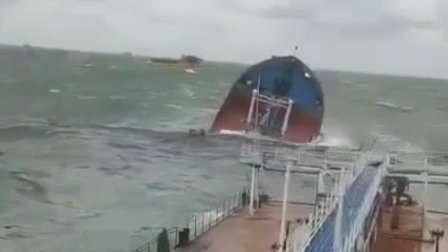
According to Russian state media, inclement weather near the Black Sea over the weekend severely damaged two Russian tankers carrying thousands of tonnes of petroleum, resulting in an oil spill.
With gusts in the region as high as 45 mph (70 kph), the Volgoneft 212 and Volgoneft 239 ships were in danger on Sunday when they were in the Kerch Strait, which separates mainland Russia from seized Crimea.
Citing Russian sources, Greenpeace Ukraine told CNN on Monday that 3,700 tonnes of oil had already leaked into the water.
They went on to say that this was a lot more than a comparable leak that occurred in 2007 and contaminated both of the Kerch Strait’s beaches, affecting thousands of birds and marine life for years.
Water was seen spilling over the top deck of a big ship as turbulent waves swayed it from side to side in a video that went viral on unauthorised Russian and Ukrainian Telegram channels.
The video’s background shows the broken-off bow of a ship that was visible just above the water level. The camera whirled around to reveal crew workers wearing life jackets.
The storm destroyed the bow of the Volgoneft 212 tanker, according to Russian state agency TASS. The tragedy claimed the life of one of the ship’s crew members.
In the Krasnodar region of Russia, Volgoneft 239 was also damaged and ran aground close to the port of Taman, according to TASS. From the ship, about 14 persons were saved.
According to TASS, emergency services reported that the tankers were transporting about 9,000 tonnes of oil. According to the report, experts were getting ready to clean up the Kerch Strait after some of this oil leaked into it.
Russia has been known to move oil from ship to ship in international waters in an attempt to get around sanctions and get it to nations like China, India, and Turkey. To get around the stringent regulations controlling this kind of oil transfer, some of these ships will depart Russia from Black Sea ports and head to the Mediterranean, where they will unlawfully switch off their transponders.
A prohibition on port access and a “ban on provision of a broad range of services related to maritime transport” were imposed on Putin’s “shadow fleet” of tankers by the European Union on Monday.
Volodymyr Zelensky, the president of Ukraine, praised the decision to target the fleet, claiming it helps move military hardware and aids Russia’s oil industry. He noted that 52 more vessels are now under sanctions, increasing the total to 79.
“Oil powers Russia’s war machine.” Putin would not have been able to deny genuine talks or undermine global peace and security for so long without multibillion-dollar oil profits, he claimed in a statement published on X.
Ukraine’s navy spokeswoman, Dmytro Pletenchuk, charged that Russia put oil transfer ahead of security. These are really antique ships. They are all at least fifty years old. He stated on Sunday that this is the reason the Russians have once again broken every rule they could have.
“They are more concerned with transferring Russian oil and other fuels and lubricants than they are with meeting the safety standards for civilian shipping,” he continued.
In a statement released on Sunday, Greenpeace Ukraine warned that the oil spill this weekend “has the potential to be serious,” particularly considering the local weather, which might make the leak “extremely difficult to contain.”
Paul Johnston, head of Greenpeace Research Laboratories, stated in the statement that the type of oil the vessels were transporting could also affect the spill’s impact. According to him, heavy residual fuel oils would harm things more than other pollutants.
amid November 2007, five ships sank amid storms in the Azov and Black Seas, causing a similar oil leak in the area.
In that incident, the Volgoneft 139 split in two because to heavy waves and severe winds, causing 560,000 gallons, or almost 1,000 tonnes, of fuel oil to leak out.




